- Home
- Samuel Beckett
Eleuthéria Page 2
Eleuthéria Read online
Page 2
agreed to publish them as well, provided that he was
not broke himself by then, and the two plays along
with the th ird novel of the trilogy were then announced as forthcoming in the pages of Beckett's first two French novels, Molloy and Malone meurt. By June
1953 Beckett had an American publisher, Barney
Rosset, of the fledgling Grove Press, about which
"Sylvia Beach said very nice things, "6 and a "first version of [the English] Godot" was "in the hands of Mr.
Harold L. Oram, 8 West 40th Street, New York, who
has our authority to treat for the performance rights
up till I think November 1st." The recognition that
Xll
SAMUEL BECKETT
Beckett had sought for so long was now in reach, and
he pursued it-but not without hesitations. He withdrew from publication Mercier et Gamier, "First Love,"
and the play that bears a curious relationship to
"First Love ," Eleu theria, which he then consistently
withheld from publication and performance.
Although Eleuthbia sat in Beckett's trunk, it
was not exactly an unknown work. Beckett destroyed
neither typescripts nor manuscript notebooks. In fact
they were finally sold or donated to major research
libraries, namely the Humanities Research Center at
the University of Texas, which holds the two manuscript notebooks, Dartmouth College, which holds the original typescript, and Washington University,
St. Louis, and the University of Reading (Reading,
England) , each of which holds a copy of the typescript. Individual copies had also circulated freely among Beckett scholars as a sort of samizdat network
once Beckett attracted sufficient reputation among
academics in the late 1950s, and a number of important studies of Beckett's dramatic works have included essays on Eleuthbia. 7 By 1986, Beckett had relented
somewhat on his ban against the play's publication.
He allowed a significant portion of it, almost a third
of it, to be published in France as part of a tribute
volume to honor his eightieth birthday, in the special issue of Revu e d 'Esthetique. 8 And several pages were published in Beckett in the Theatre: the dialogue between the Glazier and his son , of which Beckett has said, "the source of the dialogue between the boy and
Vladimir [in Waiting for Godot] is to be found in the
unpublished play Eleuthbia. "9
In fact, in the spring of 1986 Beckett was on
the verge once again of releasing the whole of
ELEUTHERIA
Xlll
Eleuthena to his long-time friend and American publisher Barney Rosset. That spring, Parisians were honoring the eightieth birthday of their adopted son , Samuel Beckett. The great museum o f modern art in
Paris, the Centre Pompidou, sponsored a week-long
celebration of Beckett's work with lectures, exhibits,
discussions, and performances. The massive special
issue of the Revu e d 'Esthetiqu e appeared in the windows of most of the city's bookshops in time for the Pompidou festivities. Beckett himself, slightly embarrassed by the attention, kept his distance, absenting himself, as was his habit, even from performances of
his work. He met with friends quietly as they came
into town at the cafe of the Hotel PLM not far from
his Boulevard St. Jacques apartment, but he spent
most of the time buried in the "Marne mud" of his
Ussy retreat. On his birthday, however, he was back
in Paris and attended a small reception at one of his
old haunts, La Coupole, which he had avoided for
over two decades, preferring the Falstaff around the
corner and finally the hygienic anonymity and privacy of the Hotel PLM.
As a group of us sipped drinks at the Bar
Americain, Beckett's American publisher, Barney
Rosset, came through the doors in a flurry announcing that he had been discharged from the company he built and ran for over thirty-three years, Grove
Press. The mood of the evening shifted. It seemed
impossible th at Rosset could be se parated fro m
Grove ; in our minds, o f course, they were one. Rosset
was Grove Press. But he had sold it a year earlier in
an effort to recapitalize. The new owners, Ann Getty
and Lord Weidenfeld, had pledged to keep Rosset
on for five years as Editor-in-Chief- or so he thought.
...
XlV
SAMUEL BECKETT
One clause of his con tract stipulated that Rosset actually served at the pleasure of the new owners, and they were di s p l e a s e d , p a r ti c u l arly at Ro sse t ' s
chronic inability to adapt to the corporate structure . We sipped our drinks and shook our heads, grumbling that if the decision to publish Beckett
rested with boards of directors, rather than visionary publishe rs like Rosse t and Lin do n , and was based on m arke tin g surveys, he would have remained an unpublished writer.
B e c ke tt arrived-rath e r m ate r i al i z e dpromptly at eight. No one saw him come in . Suddenly, he was just standing there in a grey, outsized greatcoat and brown beret. We greeted him and withdrew to a cluster of tables in the corner of the cordoned
bar area where Beckett was briefed on the Rosset affai r. Wh at could be don e , h e queri e d . Rosset shrugged his shoulders and muttered, more into the
table that to anyone in particular, "Start over, I guess."
It was immediately clear from the tenor of the conversation that for Beckett also Rosset was Grove Press.
It was Barney Rosset who was Samuel Beckett's American publisher, not some corporate entity called Grove Press. Years later, John Calder would call Rosset
Beckett's "spiritual son ," and on that snowy April
evening Beckett responded much like a spiritual father. Perhaps he might find something in the trunk to help Rosset begin yet again .
Rosset and Beckett met several times during
the week to work out details. The obvious choice was
for Rosset to publish Dream of Fair to Middling Women,
the unfinished English novel of 1932 which Beckett
later plundered for two of the stories in More Pricks
Than Kicks.lO But Dream remained a sensitive work
ELEUTHERIA
XV
for Beckett in 1986. It featured a protagonist who was
only a thinly disguised alter-ego of the author, and it
was a roman a clef Some of its models were still alive
and would surely be embarrassed by its publication .
Beckett finally settled on his first full-length play,
Eleuthma. He inscribed a copy of the play to Rosset
to seal the agreement, and withdrew to Ussy to take
on the clearly distasteful task of translating the play
into English.
Although he is listed as the translator into
English or French on almost all of his work, Beckett
never was. strictly a translator of himself. Each shift in
language produced not a literary or linguistic equivalent but a new work. Beckett's translations have always been transformations, a continuation of the creative process. There simply are no equivalents between Beckett's French and English texts. Theater, moreover, required yet another major transformation, a reconceptualization of the work for stage space. During his twenty-year career as a theatrical
director, from 1967-1986, Beckett seized any opportunity to review his plays to continue the creative process. As a theatrical director of his own work he at least revised and at times rewrote every play he directed. The task of translating Eleuthma was not as simple as it at first sounded.
&n
bsp; It came as little surprise , then , that shortly after Beckett began the task, he abandoned it as too taxing in his eightieth year. It would have meant recreating a play he wrote some four decades earlier.
Rosset was no more disappointed than Beckett himself, but Beckett offered some consolation-three short new prose works which he called Stirrings Still
and which he dedicated to Rosset.
XVl
..
SA.IUEL BECKETT
Rosset, however, never abandoned plans to
publish Eleuthbia. A draconian contract with the new
owners of the press forbid his competing with Grove
directly, and the publication of Eleuthbia would have
violated at least the spirit if not the letter of that agreement. But after Grove Press changed hands yet again , Rosset resumed plans to publish Eleuthbiain English.
On March 3, 1993, he wrote to Beckett's literary executor, the French publisher Jerome Lindon , to inform him that he was making plans to publish the work that Beckett had offered him in 1986: " . . . It is
now time to publish Eleuthbia, and I hope that we
can do so in cooperation with each other and avoid
the confusion , misunderstandings, in-fighting, and
legal battles surrounding the publication of Dream of
Fair to Middling Women. "
Lindon 's initial reply on March 5, 1993 suggested some room for negotiation . While insisting on Samuel Beckett's interdictu m on Eleuth bia, Lindon
nevertheless suggested, "I do not believe that much
in everlasting perpetuity of steadfast stand-points. It
is likely that Eleuthbia might be published some day,
in some way or other, in French first, then in other
languages. When? I cannot possibly tell you for the
time being. " Rosset continued preparations to publish the play while negotiations proceeded, commissioning a second translation from Albert Bermel and taking on a co-publisher, John Oake s and Dan
Simon 's Four Walls Eight Windows; together they
formed the company Foxrock, Inc. through which to
publish the play. The negotiations between the two
strong-willed publishers, however, grew increasingly
acrimonious. The conflict was unfortunate in a number of respects, not the least of which was that the
ELEUTHERIA
XVII
two most importan t figures in Samuel Beckett's publishing life were at loggerheads with each other, and both were acting out of the firm conviction that they
had Samuel Beckett's best interests at heart. Lindon
as best he could was trying to fulfill Samuel Beckett's
final wishes to the letter. Rosset was acting through
the hist.orical imperative that had driven his thirtythree years at Grove Press, that major work by major writers should not be suppressed or limited to an elite
that had privileged access to it. Rosset's attitude toward Eleuthbia was no different from his attitude toward Lady Chatterley s Lover or the Tropic of Cancer, except that Samuel Beckett offered the play to him directly in 1986. Beckett was fiercely loyal to his original publishers. In fact to demonstrate his confidence in Rosset, Beckett made formal in a letter of February 1, 1986, an agreement that they had between them informally: 'This is to confirm that I have appointed
you my exclusive theatrical agent for North America.
This agreement shall remain in effect until such time
as either one of us decides to terminate it."
In fact, when Rosset took on Samuel Beckett
as a Grove author, Beckett warned him in a letter
dated June 25, 1953 of the implications involved in
publishing his work:
I hope you realize what you are letting yourself in for. I
do not mean the heart of the matter, which is unlikely
to disturb anybody, but certain obscenities of form
which may not have struck you in French as they will in
English, and which frankly (it is better that you should
know this before we get going) I am not at all disposed
to mitigate. I do not of course realize what is possible
in America from this point of view and what is not. Certainly, as far as I know such passages, faithfully translated, would not be tolerated in England. II Both publishers by then had taken consider-
xviii
..
SA."M:UEL BECKETI
able risks with Samuel Beckett's work, financial and
legal, and Beckett was intensely loyal to both, making Jerome Lindon finally his literary executor and trying to insure Barney Rosset' s future by offering him
his last major unpublished work for publication.
In September 1994 Rosset decided to bring
the play to the attention of a broader audience by
offering a public reading in New York. Samuel
Beckett's nephew, Edward, denounced the action to
the New York Times, suggesting that "all those who may
be party to this New York event [i.e., the play's reading] which deliberately transgresses the will expressed by Samuel Beckett, would of course expose themselves
to legal proceedings." That threat was enough to scare
off the New York Theater Workshop, where the reading was originally scheduled to take place. Undeterred by the theater's failure of nerve , Rosset gathered the
audience outside the New York Theater Workshop
and led them through the streets of New York, a procession in search of an author, to his apartment building, where space was found for the reading. By November 22, 1994 the acrimony had increased. Rosset had been discharged as Beckett's theatrical agent, and
Lindon wrote to co-publishers john G.H. Oakes and
Dan Simon :
In order to avoid any ambiguity, I made a point of warning Barney Rosset by return post that should he publish Eleuthma then the Beckett estate would prosecute not only the publishers but all those-translators and
distributors, among others-who have been accessory
to that illicit action.
At this point of maximum conflict, when it
looked as though the only resolution to this drama
would be a protracted court battle, the issues were
resolved. A third translation was commissioned from
ELEUTHERIA
XlX
the novelist Michael Brodsky, and Lindon prepared
to publish the play in French before its English appearance. The "Avertissement" to his edition makes clear, however, that he was publishing the work against
his better judgment since Beckett considered it "u ne
piece ratee" ( a failed play) .
Rosset's position was that such judgments are
best left to history. Beckett had often been overly critical of his own work. In the letter to Rosset dated February 11, 1954, for example, Beckett noted, "It's hard to go on with everything loathed and repudiated as
soon as fprmulated, and in the act of formulation,
and before formulation ." In the same letter, Beckett
noted that he has had to resist Lindon 's pressure to
publish another oeuvre inachevee: "[Lindon] also
wanted to publish Mercier et Gamier, the first 'novel' in
French and of which the less said the better, but I
had to refuse ." It is our good fortune that Jerome
Lindon persisted and finally prevailed, and Minuit
published Mercier et Camier in 1970, Grove in 1974. It
is to our good fortune as well that Beckett's two major publishers came to an agreement about the publication of Eleuthbia.
To Lindon 's mind, "tous les vrais connaisseurs
de son travail que j'ai connus consideraient Eleutheria
comme u ne piece ratee. "And critics like Ruby Cohn have
&nbs
p; agreed. But how successful Eleuthhia is as a play (qu a
play) may not be exactly the right question to ask
about its publication. Carlton Lake, for one, places
the focus on the work's historical significance: "It is a
late-blooming transitional work and, even though
preceded by other works in French, forms a bridge
between Beckett the English language writer and
Beckett the French writer. "12 And in what is perhaps
XX
...
SAMUEL BECKETI
the most comprehensive essay written on the play,
Dougald McMillan writes:
[Eleutheria] was thus the culmination of [Beckett's] examination of the dramatic tradition of which he was a part. If we do not have for Beckett a direct manifesto
like Corneille's First Discourse on the Uses and Elements of
Dramatic Poetry, Strindberg's prefaces to Miss Julie and
A Dream Play, Zola's preface to ThereseRaquin, or Brecht's
Short Organum for the Theater, we do have in Eleuthma
Beckett's own full statement on dramatic method-a
statement which clearly influenced his later plays.l3
There is no question that Beckett was not
happy finally with this play and that he had not fully
solved all its dramatic problems, and so could not
translate it when he tried. It is after all a drama in the
throes of resisting becoming a drama. Beckett wrote
a play in which the main character refuses to or simply cannot explain the very motives of his action, which motives have traditionally driven the machinery of drama, his desire to be nothing. With Eleuthhia, Beckett was learning to risk absence on the stage, to
empty the theatrical space, first of motive, then of
character. It would take another play before he would
solve this dramatic problem of presenting "nothing"
by removing one of the cen tral characters from the
stage-Godot. Eleuthhia is not there yet, but it shows
the way. It may be only, say, Krap 's first tape, which of
course is less developed, less complete than Krapp's
last tape. But Eleuthhia is the beginning of "it all." It

 More Pricks Than Kicks
More Pricks Than Kicks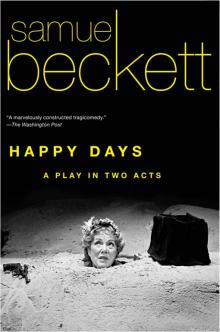 Happy Days
Happy Days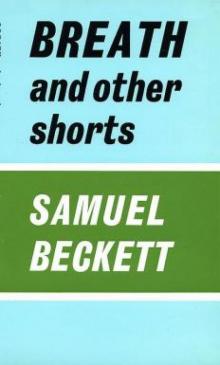 Breath, and Other Shorts
Breath, and Other Shorts Endgame & Act Without Words
Endgame & Act Without Words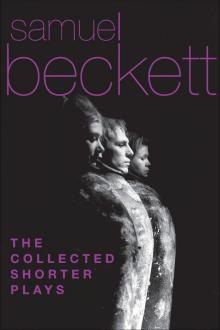 The Collected Shorter Plays of Samuel Beckett
The Collected Shorter Plays of Samuel Beckett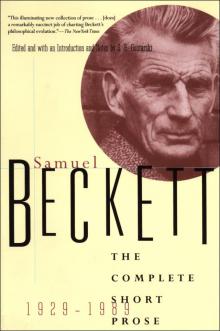 The Complete Short Prose, 1929-1989
The Complete Short Prose, 1929-1989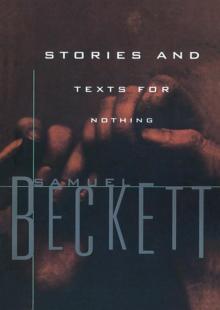 Stories and Texts for Nothing
Stories and Texts for Nothing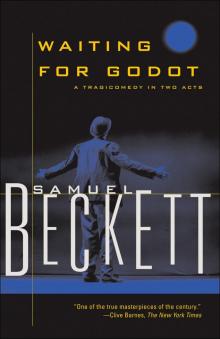 Waiting for Godot
Waiting for Godot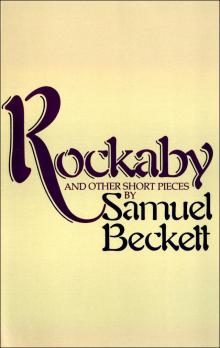 Rockaby and Other Short Pieces
Rockaby and Other Short Pieces First Love and Other Shorts
First Love and Other Shorts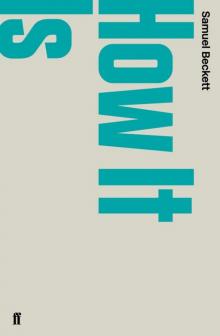 How It Is
How It Is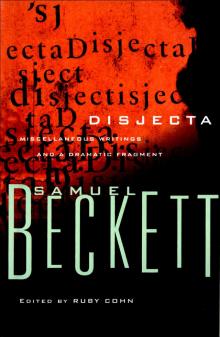 Disjecta: Miscellaneous Writings and a Dramatic Fragment
Disjecta: Miscellaneous Writings and a Dramatic Fragment Echo's Bones
Echo's Bones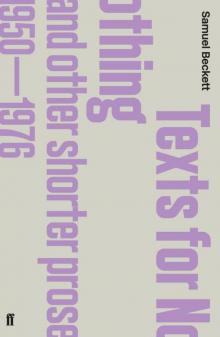 Texts for Nothing and Other Shorter Prose 1950-1976
Texts for Nothing and Other Shorter Prose 1950-1976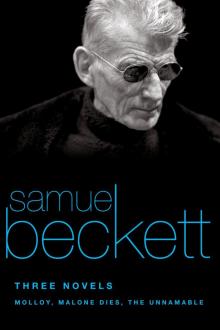 Three Novels
Three Novels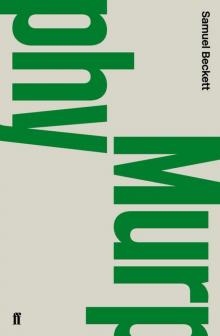 Murphy
Murphy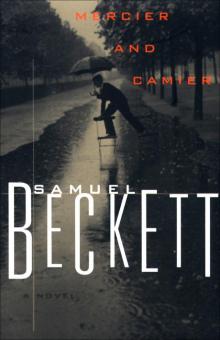 Mercier and Camier
Mercier and Camier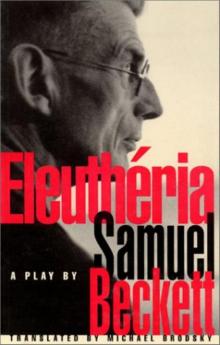 Eleuthéria
Eleuthéria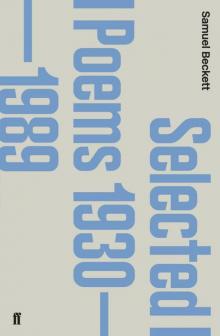 Selected Poems 1930-1988
Selected Poems 1930-1988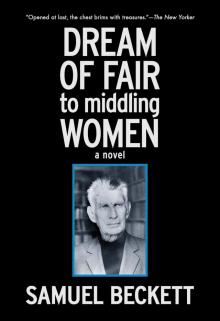 Dream of Fair to Middling Women
Dream of Fair to Middling Women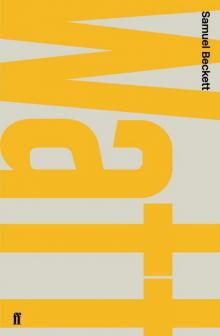 Watt
Watt Krapp's Last Tape and Other Dramatic Pieces
Krapp's Last Tape and Other Dramatic Pieces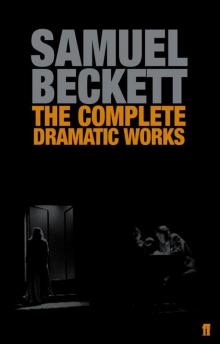 The Complete Dramatic Works of Samuel Beckett
The Complete Dramatic Works of Samuel Beckett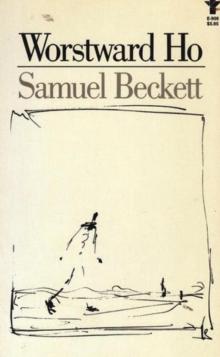 Worstward Ho
Worstward Ho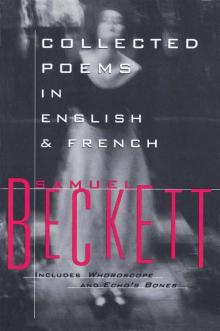 Collected Poems in English and French
Collected Poems in English and French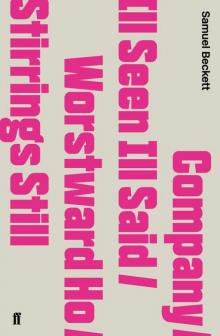 Company / Ill Seen Ill Said / Worstward Ho / Stirrings Still
Company / Ill Seen Ill Said / Worstward Ho / Stirrings Still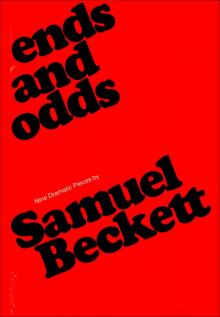 Ends and Odds
Ends and Odds Endgame Act Without Words I
Endgame Act Without Words I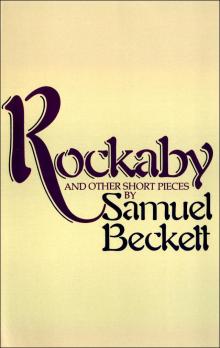 Rockabye and Other Short Pieces
Rockabye and Other Short Pieces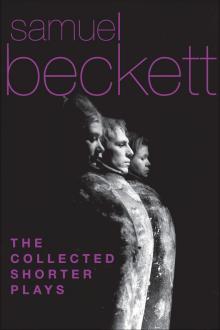 The Collected Shorter Plays
The Collected Shorter Plays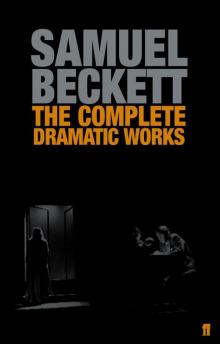 The Complete Dramatic Works
The Complete Dramatic Works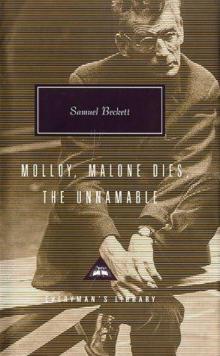 Three Novels: Malloy, Malone Dies, The Unnamable
Three Novels: Malloy, Malone Dies, The Unnamable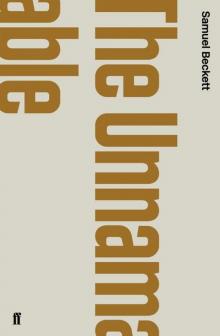 The Unnamable
The Unnamable